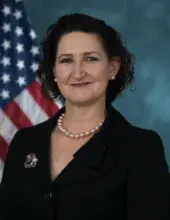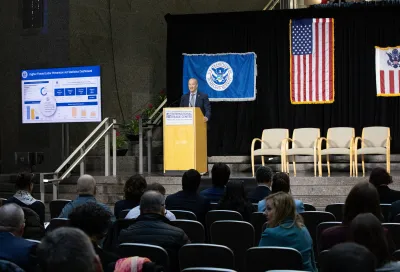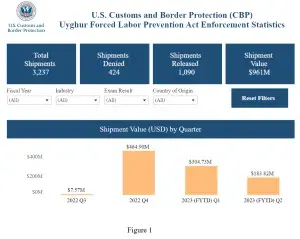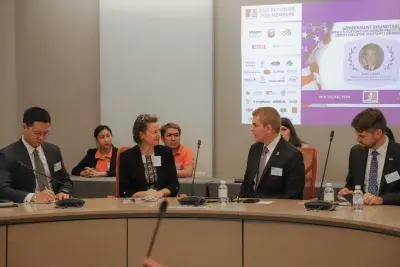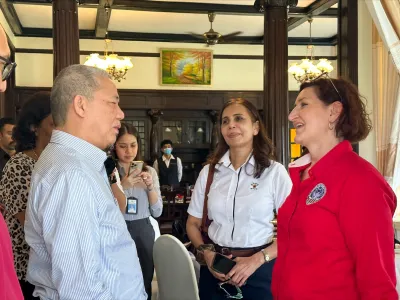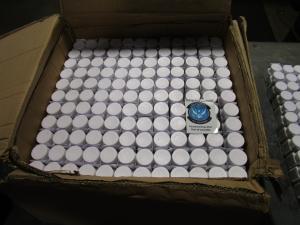-
EAC AnnMarie R. Highsmith It’s been an especially busy few months at the Office of Trade. We have much news and many accomplishments to share. You can read about many of these below, but I’d like to take this opportunity to highlight the Forced Labor Technical Expo CBP hosted in mid-March. The Tech Expo provided a unique forum for industry to provide the international trade community with information about the latest innovations in supply chain technology to help improve trade transparency and compliance with our trade laws, in particular with the Uyghur Forced Labor Prevention Act (UFLPA).
The Tech Expo also provided a platform to highlight the ongoing and innovative collaborative efforts between government agencies, industry, and non-governmental organizations. Turnout was remarkable—even better than I could have hoped. Approximately 250 people from industry, academia, civil society, partner government agencies, and foreign governments joined us in person at the Ronald Reagan Building and International Trade Center in Washington, D.C., and the virtual live stream attracted more than 9,000 views! You can watch the presentations on DVIDS.
As a result of our forced labor enforcement activity over the past several years, we’ve learned to work smarter, and we’ve positively impacted tens of thousands of lives, while ensuring greater protection for law-abiding American companies. We are also seeing a positive trend where businesses and importers are shifting behavior to maintain access to the U.S. market by developing social compliance and due diligence programs to ensure their supply chains are free of forced labor - but there is still much work left to do. The Tech Expo was a positive step in our joint engagement with industry and government partners as we continue to combat forced labor, but our aspiration is not merely to stop forced labor goods from making their way into the U.S. market. It is to eliminate this odious practice in the first place. In short, we hope to make enforcement of laws such as the UFLPA ultimately obsolete. Together, we can work towards achieving that goal.
~ Executive Assistant Commissioner AnnMarie R. Highsmith
Contents
I. Office of Trade Activity
CBP convenes Forced Labor Technical Expo
On March 14 and 15, CBP hosted its first Forced Labor Technical Expo in Washington, D.C. Government representatives from CBP and the Department of Homeland Security, the Hill, Department of Labor, and Department of State discussed resources and programs available to support industry seeking to comply with forced labor laws, including the Uyghur Forced Labor Prevention Act. The event also featured powerful speeches by leading human rights activists and researchers on the human cost of the Chinese forced labor program in the Xinjiang Uyghur Autonomous Region (XUAR). Panel discussions addressed U.S. government agency initiatives and future innovations in supply chain transparency.
Forced labor directly impacts nearly 28 million people around the world, according to the International Labour Organization. “Forced labor is a human rights issue,” CBP’s Acting Commissioner Troy Miller told attendees. “It is a moral issue dealing with fundamental human rights to work without abusive working and living conditions, intimidations and threats, physical and sexual violence, withholding of wages, excessive overtime, debt bondage, deception, and others.” Acting Commissioner Miller also noted that forced labor is also an unfair trade practice that “undermines the ability of companies that treat workers fairly to compete in the global economy.”
Miller was joined by CBP’s Office of Trade Executive Assistant Commissioner (EAC) AnnMarie Highsmith and the Executive Assistant Commissioner of the Office of Field Operations Pete Flores. Together they oversee the agency’s trade mission. “How can we do better as an international trade community?” EAC Highsmith asked. “If we are enforcing the law at ports of entry, it is too late. The purpose of our legal structure is to prevent merchandise from being made with forced labor in the first place.”
In a powerful address, Nury Turkel, Chairman of the U.S. Commission on International Religious Freedom and an ethnic Uyghur himself, accused the Chinese government of using forced labor to eliminate the ethnic group. “This forced-labor-placement policy is a core tool of the ongoing genocide – a tool for keeping people under surveillance, ripping families apart and separating parents from their children, and ensuring that people of marriageable age cannot form their own families,” he said. “Forced labor is a core tool to achieve the near-complete erasure of the Uyghur people within a generation.”
During the Expo, 19 vendors presented state-of-the art technical solutions to map supply chains, assist traceability, demonstrate provenance of raw material, and aid in risk assessment. But even as these technologies provide powerful new tools in the fight against forced labor, they do not replace industry’s fundamental responsibility to exercise due diligence and carefully examine their entire supply chains. As EAC Highsmith told the audience, there is no “magic wand” which we can wave to make the problem disappear. Nevertheless, “We can't put this into the ‘too hard box.’” There is simply too much at stake.
CBP launches new UFLPA Enforcement Statistics Dashboard
Since the UFLPA rebuttable presumption went into effect, stakeholders have been requesting information on CBP’s enforcement actions. To respond to this need, CBP launched an interactive dashboard sharing UFLPA enforcement statistics on the first day of the Tech Expo.
- The UFLPA Enforcement Statistics Dashboard provides aggregated data to ensure that CBP complies with all legal requirements to maintain the privacy of importer-specific data.
- The data provided includes shipments identified for further inspection or enforcement activity under UFLPA based on suspicion of a UFLPA violation, shipments released, shipments denied entry into U.S. commerce, and the value of those shipments. Users can filter the data in the dashboard to show shipments stopped, denied, and released, as well as filter by country of origin.
Posted on CBP’s public website, the dashboard is one of several CBP efforts to ensure transparency and provide information and guidance to support UFLPA compliance. Read more about the Tech Expo and the UFLPA Dashboard in the press release.
II. Outreach
DEAC Leonard showcases CBP’s digital solutions for small businesses in Southeast Asia
Deputy Executive Assistant Commissioner (DEAC) John Leonard addressed the Trade Winds conference in mid-March in Bangkok, Thailand. The conference convened U.S. commercial diplomats from over 20 Asian countries to discuss how to help companies achieve growth and exposure, especially in the Asian market.
During the conference, DEAC Leonard answered questions about the digital tools CBP has developed to help small businesses navigate the requirements they need to ship their goods through complex, global supply chains. He shared how CBP is spearheading technological transformation in supply chain management by developing more transparent digital tools. Some of these tools help the U.S. government facilitate legitimate trade by improving the quality and usage of collected data; other digital tools help businesses clearly understand relevant trade regulations so that they don’t encounter challenges with international shipments.
On the trip, DEAC Leonard engaged with the American Chamber of Commerce in Thailand and the U.S. Association of Southeast Asian Nations Business Council, along with other key trade and government stakeholders, including the World Customs Organization and the U.S. Ambassador to Thailand.
CBP engages government and industry in Malaysia to combat forced labor
A United States government delegation traveled to Malaysia from February 12-20, 2023, to participate in various engagements with members of the government of Malaysia and business/industry stakeholders. CBP’s delegation included: AnnMarie Highsmith, Executive Assistant Commissioner, Office of Trade; Eric Choy, Executive Director, Trade Remedy Law Enforcement Directorate, Office of Trade; and Lesleyanne Kessler, Deputy Associate Chief Counsel. The delegation met with the Secretary General of the Ministry of Plantation, Industries and Commodities, the Secretary General of the Ministry of International Trade and Industry, as well as with officials from the Malaysia Ministry of Human Resources and the Royal Malaysia Customs.
The delegation also visited the Sime Darby Palm Oil Plantation and met with members of the Malaysian Palm Oil Association, the Malayan Agricultural Producers Association, and the Malaysian Palm Oil Council to discuss international labor standards and human rights obligations and to explore approaches to effectively implement technology and remediation measures that can benefit workers. The delegation also participated in a round table discussion with various members of the trade industry in Malaysia at the American Malaysian Chamber of Commerce.
As a result of CBP’s extensive work with Malaysian government and industry, labor conditions are improving for thousands of migrant and vulnerable workers. In the past three years CBP has modified two Withhold Release Orders and one Finding that were originally issued against Malaysian companies.
CBP shares best trade practices with the government of India
On March 9, CBP participated in a meeting with personnel from India Customs and the Office of the United States Trade Representative. Among the topics of discussion were digitalization of entry data, approaches to risk management, data verification for low-value shipments, and strategies for ensuring compliance with partner government agency requirements.
CBP also participated in an information session for India’s Office of the Controller General of Patents, Designs, and Trade Marks. The government of India expressed interest in developing interagency coordination in intellectual property rights enforcement, similar to the work of the Department of Homeland Security’s National Intellectual Property Rights Center. The U.S. Patent and Trademark Office hosted the session, which featured speakers from multiple U.S. government agencies. CBP presented an overview of the U.S. border enforcement model. The government of India expressed interest in further cooperation with U.S. technical experts.
III. News You Can Use
15,000 Viagra pills worth over $1 million seized by Louisville CBP
LOUISVILLE, Ky. - On March 1, Customs and Border Protection (CBP) officers intercepted 500 bottles of Viagra arriving from Hong Kong. Each bottle contained 30 100 milligram tablets, for a total of 15,000, pills. The shipment was heading to an individual in Brooklyn, NY. If genuine, the pills would have had an estimated manufacturer’s suggested retail price (MSRP) of over $1 million. The bottles had labels stating they were made in the USA, but those claims are suspect as the pills were being imported from an industrial company in Hong Kong.
Medications purchased from online sources can be improperly produced without pharmacological specifications and safeguards that ensure the protection of human health. Prescription medications manufactured in non-regulated foreign companies often contain dangerous contaminants or ineffective compounds that can endanger consumers even though they look like genuine products.
Gold nuggets and bars worth $67,830 seized by Cincinnati CBP
Chicago – In separate incidents Feb. 1, CBP officers at Chicago O’Hare International Airport’s International Mail Facility seized more than $76,000 in counterfeit currency and counterfeit merchandise that would have been worth $465,000 had it been genuine. The officers inspected five packages from China and found the counterfeit bills in denominations ranging from $1 to $100. The shipments were heading to Houston and Mission, Texas; Greenbush, Minn.; Oklahoma City, Okla.; and Morris, Ill.
Even though the counterfeit bills were marked and were going to be used as prop money, it is a violation of federal law to reproduce currency. The counterfeit currency was turned over to Homeland Security Investigations and U.S. Secret Service for investigation. Meanwhile, at another terminal in the airport, a U.S. citizen returning from Turkey told officers he had purchased $1,000 worth of gifts for family and friends. Those ‘gifts’ were 61 counterfeit items, including watches, clothing, handbags, phone cases, sunglasses and jewelry. CBP said counterfeiting and intellectual property rights piracy cost the U.S. economy between $200 billion and $250 billion per year. They are responsible for the loss of 750,000 American jobs and pose a threat to health and safety of American consumers.
Trade Statistics
Uyghur Forced Labor Prevention Act Enforcement Statistics Dashboard
The Uyghur Forced Labor Prevention Act Enforcement Statistics Dashboard shows the cumulative statistics of goods stopped from the UFLPA implementation date of June 21, 2022, to March 14, 2023. In this time period, CBP stopped 3,237 total shipments, valued at $961 million, which were subjected to UFLPA reviews or enforcement actions. CBP denied a total of 424 shipments and released 1,090 shipments into the U.S commerce. The remaining shipments are pending a determination. The Shipment Value (USD) by Quarter bar chart (Figure 1) shows the aggregate value of shipments subject to the UFLPA act per quarter. Malaysia, Vietnam, and China occupy the largest amount of these shipments with 3,198 total subject to review or enforcement actions valued at over $950 million, combined.


